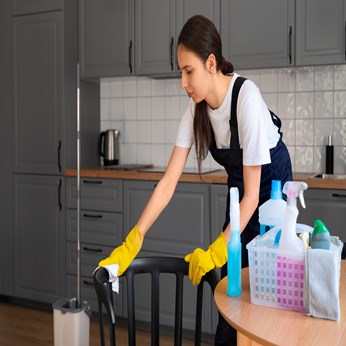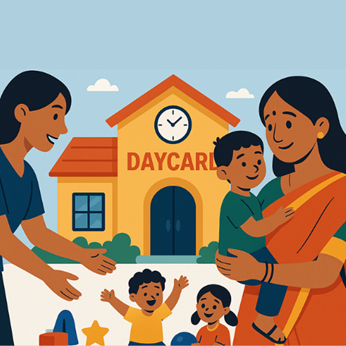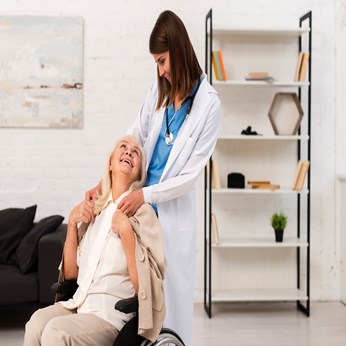Some Important Nutrition Tips For Elders
As caretakers we have to make sure that our elders take a balanced diet that consists of a variety of fruits, vegetables, protein and whole grains that are needed for overall health. Besides a balanced diet gerontologists or senior care doctors feel there are other specific things that attention is to be paid to.
Gerontologists or elder care doctors advice caretakers to give elders a diet rich in Omega 3 fatty acids at least twice a week; these fatty acids are found in many types of fish and flaxseed and flaxseed oil. Omega 3 fatty acids reduce inflammation that causes arthritis, cancer and heart disease; in the absence of Omega 3 fatty foods, caregivers like us could ask the doctor to prescribe an Omega 3 supplement.
Next elders require calcium and vitamin D that helps preserve their bone health and lower blood pressure; elders need to take 1200 milligrams per day of the nutrient that equals 4 cups of milk. This could be very difficult in the case of many elders and could be made good by prescription of a suitable calcium supplement.

It is very important that we as caregivers make sure that our elders drink enough water; most elders feel less thirsty as they age and so may not realize that they have to drink a glass of water. The urine of the elder is the best indicator of being hydrated or not; clear and light urine indicates proper hydration, while a dark and cloudy one indicates the elder needs to drink more liquids.
Next and most important it is necessary for caregivers like us to reduce the elder’s intake of sodium; this is all the more important for elders that suffer from hypertension or high blood pressure. Being a smart caregiver would mean avoiding or restricting frozen, processed or restaurant food that is high in sodium and instead including more fruits and vegetables that are low in sodium in the elder’s diet.
Dietary changes may be very difficult for elders to make as they get stuck in their habits. However these changes for the well being and health of our elders can be made in 3 ways.
1) Make small changes in the diet and incorporate new foods gradually; if the elder is a diabetic, slowly adjust his/her carbohydrate intake by incorporating oatmeal once or twice a week at breakfast and giving it more often when the elder gets used to it. The same applies for substituting wheat bread or multigrain bread that is healthy for white bread.

2) Making changes in your elder’s diet becomes easier when you cook the same meal for the whole family, so that the elder does not feel singled out. As you sit together and have the same meal together dietary changes would become easier than drastic.
3) Some elders especially those with dementia refuse to make the necessary nutritional changes; it pays to be creative and give essential nutrients to elders in the form of smoothies. An elder needing more protein could be given a smoothie made with wheat germ that has high protein content and does not interfere with his medications.
Are you confident of looking after the nutrition needs of your elder?
Image Courtesy: Google
Take the next step toward your goals
Share your requirement and find the best care providers in your area
-
Looking for a caretaker’s job? Build your profile and get in touch with families in your vicinity.
-
Discover nannies, babysitters, cooks, housekeepers, pet sitters, and elder care under one roof.
-
Get all the support you need to run a successful care center.
-
Search for appropriate centers near you depending on your needs.
Care Corner Insights: Blog Library

Deep Cleaning Your House: Room-by-Room Checklist for a Thorough Clean
A sparkling clean home isn’t just about looks—it’s about health, comfort, and peace of mind. Whether you’re prepping for a festival, hosting guests, or just tired of the clutter, a deep clean can transform your space. But where do you start? Here’s a

What are Senior Apartments? Experts Explain Independent Living for Older Adults
As we age, our needs and lifestyles evolve—but one thing remains constant: the desire for independence. Senior apartments are designed precisely with this in mind, offering older adults a living arrangement that balances freedom with comfort, safety,

Baby Sleep Problems: What is Sleep Regression and How to Handle It
If you’re a parent, you know that baby sleep is one of the greatest mysteries of life. One day your little one is snoozing like an angel, and the next day they’re suddenly waking up every hour, fussing, or refusing to nap. Before you panic, there’s a

Daycare Admissions in Cary, NC for New NRI Families: Documents, Health Records, and Start Dates
Moving to a new country is exciting but also comes with many responsibilities—especially when it comes to finding the right daycare for your little one. For new NRI (Non-Resident Indian) families settling in Cary, NC, understanding the daycare

Overnight Babysitters in Bellevue, WA for Business-Travelling NRI Parents: Safety & Policies
For many NRI parents living in Bellevue, WA, frequent business trips are a reality. While traveling, one of the biggest concerns is ensuring your children are safe, cared for, and emotionally supported during overnight stays. Overnight babysitters ca

Indian Home-Style Cooks in Queens, NY: Tiffin-Style Weekly Meal Prep from Your Kitchen
Queens, NY, is home to one of the most diverse food cultures in the country, and Indian cuisine holds a special place among families looking for authentic, comforting meals. While restaurant takeout is convenient, nothing compares to the taste and nu

Baby Sleep Problems: What is Sleep Regression and How to Handle It
If you’re a parent, you know that baby sleep is one of the greatest mysteries of life. One day your little one is snoozing like an angel, and the next day they’re suddenly waking up every hour, fussing, or refusing to nap. Before you panic, there’s a

What is Validation Therapy? A New Approach to Dementia Care
Caring for loved ones with dementia is one of the most emotionally challenging journeys a family can face. Traditional methods often focus on correcting memory lapses or redirecting confused thoughts—but that can sometimes lead to frustration, stress

What is a Part-Time Nanny and Do You Need One
Parenting is a beautiful journey, but let’s be honest—it can also be exhausting! Between work deadlines, household chores, and family responsibilities, sometimes there just aren’t enough hours in a day. That’s where part-time nannies step in, offerin

Part-Time Housekeeper Hiring in Alpharetta, GA: Weekly Schedules, Pricing, and Must-Do Tasks
Keeping a home spotless while balancing work, family, and personal commitments can be overwhelming. For families and professionals in Alpharetta, GA, hiring a part-time housekeeper is one of the most practical solutions. Whether you need help once a